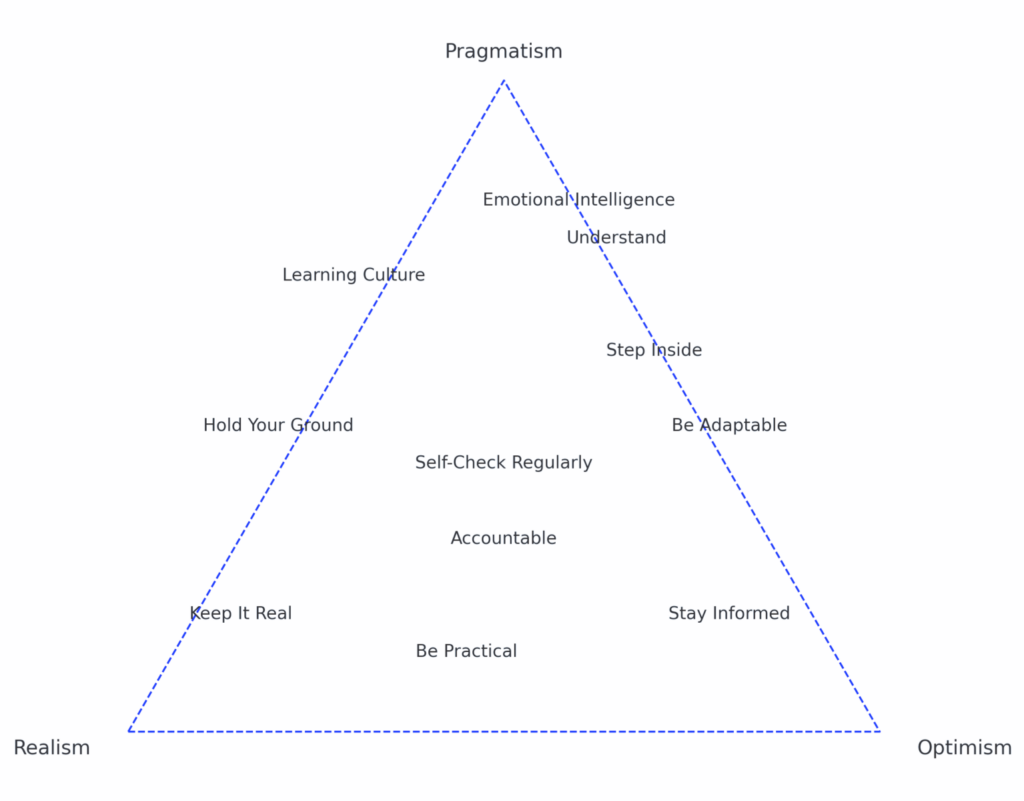Meeting the Real-world Needs without Losing Depth
Think of navigating the Organization Development (OD) field as standing at the intersection of a triangle formed by pragmatism, realism, and optimism.
- Pragmatism pushes us to find workable solutions,
- realism grounds us in the limitations of organizational life, and
- optimism fuels our belief in transformative change.
Each point of this triangle interacts with the others. Within this dynamic intersection, the complex-responsive-process of interaction unfolds, where ongoing dialogues within and between departments become the lifeblood of OD.

The Practical Struggle: Simplicity vs Complexity
Over a career spanning nearly 25 years in OD, I’ve often found myself navigating this triangle. The drive to be intellectually ahead, fueled by optimism, has been a constant. But my joy with learning and philosophical argumentation is not often welcomed at the meeting room table. The current organizational landscape often leans heavily towards the ‘realism’ point of the triangle. Immediate results are the order of the day. This reality might be disheartening, but it allows us to lean into pragmatism. As Dr. Damon Centola would suggest, we can effectively create ‘fishing nets’ of change rather than waiting for the unpredictable ‘fireworks.’
Emotional Intelligence: Beyond the Buzzword
Emotional intelligence is not just a trendy catchphrase; it’s a vital point in our triangle of OD navigation, closely tied to pragmatism. This tool goes beyond ‘reading the room’ or ‘being empathetic.’ Sometimes, it’s about diving deep into the darker alleyways of human behavior, such as the Dark Triad. These unconventional traits can offer actionable insights, enriching the complex-responsive-processes that unfold within organizations. This level of emotional nuance enables us to manage the dynamics between departments and teams better.
Reflective-Praxis: Down-to-Earth Actions for OD Practitioners
- Keep It Real: Recognize that not every organization is open to deep systemic change. Choose your battles wisely and create ‘fishing nets’ of influence to maximize impact.
- Stay Informed, but Be Practical: Intellectual rigor is invaluable but needs to be actionable. Always ask, “How can this be applied here and now?”
- Dig Deeper into Emotional Intelligence: Emotional intelligence contributes to all triangle points. Expand your understanding to include unconventional but impactful traits.
- Be Adaptable, but Hold Your Ground: Adapt your approaches without compromising ethical practice or long-term effectiveness.
- Self-Check Regularly: Personal accountability is crucial. Regularly assess your role within the triangle. Are you facilitating meaningful dialogues or just going through the motions?
- Promote Learning and Discussions: Create environments where teams can share, learn, and engage in complex-responsive interactions.
- Step Inside to Understand: Taking an internal role offers a unique vantage point to understand organizations’ complex, interactive dynamics.
The Unbalanced Path Forward
As I transition to an internal OD role, it’s not a retreat but a recalibration. The field of OD isn’t just a set of academic theories; it’s a living, breathing discipline that unfolds in the real world. It’s about standing with others in the triangle of pragmatism, realism, and optimism to bring about meaningful change without losing sight of organizations’ practical limitations.

